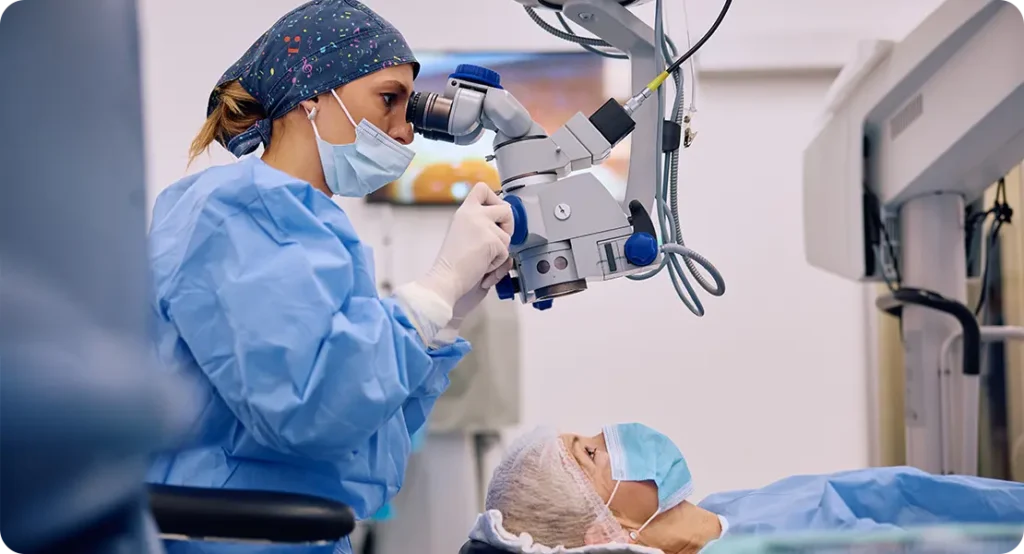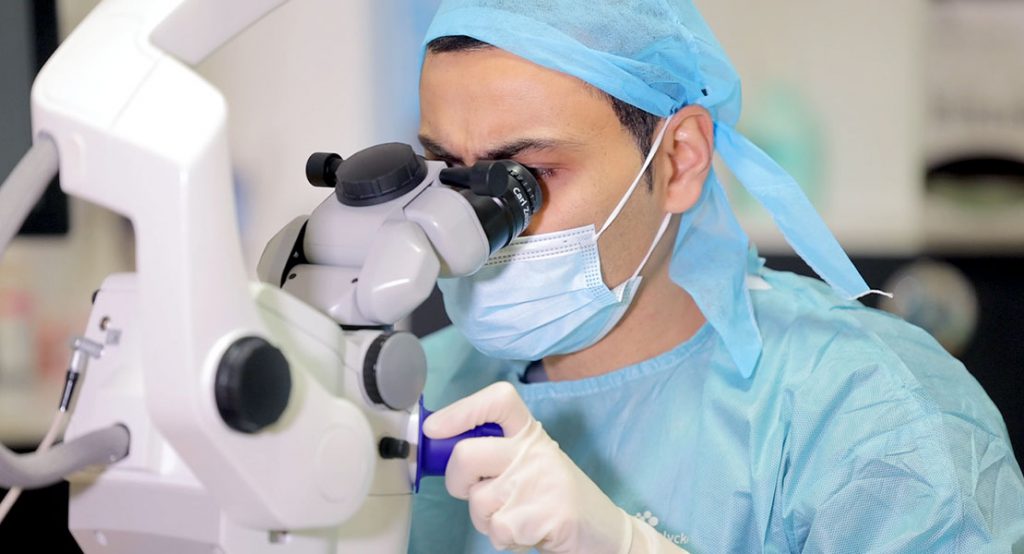Cataract surgery is one of the most commonly performed procedures in the UK, and patients often wonder whether to go through the NHS or opt for private care. If you’re weighing up your options, you’re not alone – there are pros and cons on both sides. To help you make an informed decision, I’ve answered 15 of the most common questions people ask when deciding between NHS and private cataract surgery.
1. What are the main differences between NHS and private cataract surgery?
When it comes to cataract surgery, both the NHS and private sector follow the same basic procedure – removing the cloudy lens and replacing it with an artificial one. However, the experience leading up to and following the surgery can be quite different. With the NHS, the process is standardised and focuses on medical need. In contrast, private clinics tend to offer more customisation, such as premium intraocular lenses and advanced diagnostic tools.
Another difference is how quickly things move. On the NHS, you might wait weeks or even months depending on your local hospital’s capacity. Private providers often offer much faster access, sometimes within a few days of your initial consultation. This can be a major factor for those who are struggling with vision issues and want things resolved quickly.
Post-operative care also varies slightly. NHS follow-up appointments are usually limited and may not involve the same level of personalised care you might get privately. Many private clinics provide direct access to your surgeon, 24/7 helplines, and extended check-ups, which can offer added peace of mind.
Finally, the environment itself is often more comfortable in private clinics. From shorter waiting times in reception areas to the possibility of choosing a specific surgeon, the private route tends to feel more personal and less rushed. But of course, all this comes at a cost – literally.
2. How long will I have to wait for cataract surgery on the NHS?
Waiting times on the NHS can vary a great deal depending on where you live in the UK. In some areas, patients can get seen relatively quickly – within 6 to 10 weeks after referral. But in other regions, especially where NHS resources are stretched, the wait can be much longer, even up to 6 months or more in some cases. It’s not necessarily based on how bad your vision is, but rather on the overall demand in your area.
One reason for this is that cataract surgery is classified as a non-urgent procedure. That means it’s often pushed down the list when urgent or life-threatening cases come through. NHS ophthalmology departments are under a lot of pressure, and while they do their best to meet targets, there’s only so much capacity they can manage at once.
It’s also worth noting that even after your referral, there may be delays before your first assessment or pre-operative appointment. This can add extra weeks to the process. During that time, your vision might continue to deteriorate, which can impact your daily activities and quality of life, especially if both eyes are affected.
If you’re finding the wait particularly difficult, it’s always worth discussing your situation with your GP or optometrist. In some cases, they can push for an urgent referral, particularly if your vision is affecting your safety, mobility, or ability to work. But unfortunately, there’s no guaranteed fast-track unless it’s deemed a high-priority case.
3. Is private cataract surgery worth the cost?
Private cataract surgery does come with a significant price tag – often ranging from £2,000 to £4,000 per eye depending on the lens and clinic you choose. But for many people, the cost is justified by the shorter waiting times, personalised service, and access to advanced technology. If you’re in a position to pay for it, it can be a more comfortable and tailored experience.

One of the big draws of going private is the range of intraocular lenses (IOLs) on offer. While the NHS typically provides a standard monofocal lens that corrects vision at one distance, private clinics offer premium options like multifocal or toric lenses. These can reduce or eliminate the need for glasses after surgery, which many patients find incredibly appealing.
You’re also more likely to have continuity of care in the private sector. You’ll often see the same consultant from start to finish, which can help you feel more confident and informed. Plus, many private clinics offer a more flexible appointment schedule, including evenings or weekends, which can be very helpful if you’re still working or have other commitments.
So, is it worth it? That really depends on your personal situation. If the NHS wait is manageable for you and you’re fine with wearing glasses post-op, it might not be necessary to spend the extra money. But if you’re after quicker results, advanced lens options, and a more individualised service, private surgery could be well worth the investment.
4. Do both NHS and private surgeons have the same level of skill?
Yes – in most cases, the surgeons working in the private sector are the same highly qualified professionals who also work in the NHS. Many consultant ophthalmologists divide their time between NHS hospitals and private clinics. So, whether you go NHS or private, you’re often getting the same skilled hands performing your procedure.
The key difference isn’t usually the surgeon’s ability, but rather the setting and pace of care. In the NHS, surgeons may be expected to complete a high number of operations within a day due to time constraints and large patient volumes. In a private clinic, the schedule tends to be less pressured, allowing for a more relaxed environment and longer consultations.
What can vary, however, is the technology available. Private clinics often invest in the latest imaging and surgical equipment, which may allow for even more precise customisation of your lens implant. This doesn’t mean NHS surgery is less effective – far from it – but you may get a few more options when going private.
Ultimately, whether you’re treated on the NHS or privately, cataract surgery in the UK is generally very safe and effective. The complication rates are low in both settings. So, it’s not so much about the surgeon’s skill, but rather about the broader experience and flexibility around your care.
5. What lens options are available on the NHS versus privately?
On the NHS, most patients receive a monofocal intraocular lens. This lens is excellent for restoring vision at a single focal point – usually set for distance vision – but you’ll likely still need glasses for reading or intermediate tasks. It’s a reliable and effective choice, but it doesn’t cater to every lifestyle need.
If you choose to have your cataract surgery done privately, the lens options are far more varied. You can opt for multifocal lenses, which provide a range of focus points and can reduce the need for glasses entirely. There are also toric lenses available for those with astigmatism, something that’s not routinely covered by the NHS.

These advanced lenses can make a noticeable difference to your visual outcome and daily convenience. However, they do come at a cost and aren’t suitable for everyone. Factors like the shape of your eye, your overall eye health, and any other conditions (like macular degeneration or glaucoma) can affect your eligibility for premium lenses.
If you’re not sure which lens is best for you, a detailed consultation with your surgeon – whether NHS or private – can help clarify things. Just be aware that on the NHS, your choices may be limited to the standard offering unless there’s a strong medical reason to go beyond that.
6. Is there a difference in the aftercare provided?
There definitely can be. On the NHS, you’ll usually have a post-operative follow-up appointment to check your eye’s healing process and vision. Beyond that, unless complications arise, your follow-up is relatively limited. Some patients are discharged back to their optician for further care after just one hospital visit.
With private cataract surgery, aftercare is generally more comprehensive. Most private providers include a full package of post-operative check-ups, often with direct access to your surgeon or an ophthalmic team. You’ll also get quicker appointments if anything feels off, rather than having to go through your GP for a referral back into the NHS.
This extra layer of support can be reassuring, especially in the days after surgery when your vision is adjusting and you’re dealing with things like light sensitivity or blurry spots. Having someone you can call directly – and see quickly if needed – can make a big difference to your peace of mind.
That said, many patients on the NHS still have a smooth recovery with no issues. If problems do arise, the NHS will step in and treat you appropriately. So, while private aftercare may offer a more polished experience, both systems are ultimately there to ensure your eye heals properly.
7. Can I switch from NHS to private partway through the process?
Yes, it is possible to start your cataract journey with the NHS and then switch to private care if you feel it’s the right choice for you. Some people begin with an NHS referral but later decide that the wait time or limited lens options don’t suit their needs, prompting a move to the private route.
If you’ve already had your NHS assessment or are on a waiting list, you can contact a private provider to arrange a consultation. Just be aware that if you’ve had certain tests done on the NHS, these may need to be repeated privately, especially if the clinic uses different equipment or protocols. So you may have to go through the process again from the beginning.
It’s also important to understand that you can’t mix and match services. For example, you can’t have your surgery done on the NHS and then pay privately for a premium lens – that’s against NHS policy. If you want a private lens, you’ll need to have the entire surgery done privately.
Switching from NHS to private isn’t uncommon and it’s nothing to feel awkward about. You’re entitled to make choices that are right for your eyesight and lifestyle. Just keep in mind the logistics, especially if your surgery is already scheduled with the NHS.
8. Will my outcome be better if I go private?
It’s a common assumption that private equals better, but that’s not always the case – at least not when it comes to the surgical outcome itself. NHS cataract surgery is performed to a high standard, and the majority of patients have excellent results with restored clarity and improved vision. So, in terms of safety and success rates, the outcomes are comparable.
Where private surgery can potentially offer a “better” outcome is in terms of visual freedom. With premium lenses like multifocals or torics, there’s a chance you’ll rely less on glasses, which can feel like a huge improvement in day-to-day life. If that’s a priority for you, private options might be worth considering.

There’s also the comfort factor to consider. Private clinics may allow more time for surgery, use enhanced scanning technology, and offer longer pre-operative consultations. This might lead to a more tailored experience and a lens choice that’s more closely matched to your personal needs and expectations.
That said, a great outcome isn’t just about the lens – it also depends on the health of your eye, how well you heal, and whether there are any coexisting conditions. So even if you go private, it’s essential to have realistic expectations. A good surgeon will guide you through what’s genuinely achievable based on your situation.
9. What if I have cataracts in both eyes?
If you have cataracts in both eyes, it’s very likely you’ll need two surgeries – one for each eye. Whether you go NHS or private, it’s common to wait at least a week or two between operations to allow the first eye to settle and heal. The main difference is how quickly the second surgery is scheduled.
On the NHS, the second eye might not be operated on immediately after the first. There could be a delay of several weeks or even months depending on the hospital’s capacity and local policy. This gap can be frustrating, especially if the untreated eye is still significantly affecting your vision.
In private clinics, you can usually book the second eye surgery quite soon after the first – sometimes just a few days later. This faster timeline helps reduce the period of visual imbalance between the two eyes, which some patients find disorienting. It also allows for a quicker return to normal routines like driving or reading comfortably.
Whether NHS or private, having both eyes treated tends to lead to the best long-term results. The key is managing the period in between surgeries, especially if there’s a noticeable difference in vision between the two eyes. Your eye care team will guide you on how to cope with this and when the second surgery will be appropriate.
10. Can I drive after cataract surgery?
Driving is something most people are eager to get back to, and understandably so. After cataract surgery, you’ll need to wait until your vision meets the DVLA’s legal driving standard. For many patients, that means a few days to a week after the operation, although this varies depending on how quickly your vision stabilises.
With NHS surgery, you’ll typically be advised by your hospital team or optometrist when it’s safe to drive again. You might need to wait for your follow-up appointment for official clearance, which can delay things a bit. Privately, you might get this advice sooner, especially if your check-up is just a day or two after surgery.

It’s important to follow the guidance you’re given. Even if your eye feels fine, glare sensitivity or reduced contrast can make driving dangerous in the early days. Remember, it’s not just about comfort – the DVLA sets specific vision standards that need to be met to ensure you’re safe behind the wheel.
Once your vision clears, many people find that their driving confidence improves dramatically. Colours are sharper, night driving becomes easier, and overall clarity improves. Whether you’ve had surgery privately or on the NHS, regaining independence on the road can be one of the most satisfying milestones in your recovery.
11. Will I still need glasses after cataract surgery?
That really depends on the type of lens you receive. If you have NHS surgery, you’ll most likely receive a monofocal lens that focuses at one distance – usually for far vision. That means you’ll still need glasses for reading or intermediate activities like using a computer. It’s completely normal and expected.
If you choose private surgery, you might be offered premium lenses that allow for vision at multiple distances. Multifocal or extended depth-of-focus lenses can help you reduce your dependence on glasses altogether. Toric lenses, which correct astigmatism, can also improve overall clarity if that’s a factor for you.
That said, no lens is perfect. Some patients with premium lenses still find they need glasses for specific tasks, especially in low-light situations or when doing very fine work. And in rare cases, you might not adapt well to a multifocal lens, which can cause issues like glare or halos.
Ultimately, your lifestyle and personal preferences should guide your choice. If you’re someone who doesn’t mind wearing glasses occasionally, NHS surgery might suit you just fine. But if you’re after the convenience of less eyewear and your eyes are suitable for it, a private option could be more aligned with your goals.
12. What’s included in the cost of private cataract surgery?
Private cataract surgery is usually offered as a package deal, but it’s essential to understand what’s actually included before committing. Most reputable clinics provide a clear breakdown of costs upfront, which should cover the consultation, surgery, lens implant, post-operative care, and any necessary follow-up appointments.
Some packages are all-inclusive, meaning you won’t pay extra if you need additional check-ups or if minor complications arise. Others may charge separately for specific lenses, additional scans, or extended aftercare. So it’s worth reading the small print and asking questions before going ahead.
Also, not all packages include the same types of intraocular lenses. Basic packages may only offer standard monofocal lenses, while advanced lenses like multifocal or toric ones can cost significantly more. Some clinics list these as optional upgrades, which could push the total well beyond the starting price.
If you’re using private medical insurance, check your policy carefully. Some insurers cover standard cataract surgery but exclude premium lenses or newer technologies. Even with insurance, you may still need to pay part of the cost yourself. Transparency is key – don’t be afraid to ask the clinic to spell everything out clearly.
13. Are there risks with both NHS and private surgery?
Cataract surgery, whether done on the NHS or privately, is generally very safe and effective. Complication rates are low across the board. However, as with any surgery, there are always risks involved – and it’s important to be aware of them regardless of where you’re having your procedure.
The most common risks include infection, inflammation, swelling, or retinal detachment, though these are quite rare. Sometimes, patients experience clouding of the lens capsule (posterior capsular opacification), which can be corrected later with a quick laser treatment called YAG capsulotomy – usually covered on the NHS or within a private aftercare package.
These risks don’t differ much between NHS and private surgery because the procedure itself is fundamentally the same. What can vary is how quickly you’re able to access follow-up care if something does go wrong. In the private sector, you might be seen the same day; on the NHS, it may take a bit longer.
What really matters is that you follow your aftercare advice carefully. Keep your eye clean, use your prescribed drops, and attend all follow-up appointments. Whether NHS or private, a smooth recovery often comes down to good patient habits and prompt communication if anything feels off.
14. Can I get cataract surgery done abroad instead?
Some people consider going abroad for cataract surgery, especially if they’re looking to save money or want to access advanced lenses at a lower price. There are clinics in Europe and further afield offering attractive packages, and some even market directly to UK patients looking for a quick turnaround.

While there are reputable clinics overseas, there are also risks involved. The main concern is what happens if something goes wrong after you return home. You won’t have the same easy access to follow-up care or your original surgeon, which can complicate things if you need treatment for a complication.
There may also be differences in standards, language barriers, and regulatory oversight. You need to do very thorough research if you’re thinking about this route – including checking the surgeon’s credentials, infection control procedures, and what kind of lenses they use.
If cost is your main concern, you might be better off looking into private clinics here in the UK that offer interest-free payment plans. While surgery abroad can be cheaper upfront, any problems that arise can end up costing far more in the long run – both financially and in terms of your eyesight.
15. How do I decide which option is right for me?
It really comes down to your personal priorities. If your budget is limited and you’re willing to wait, the NHS offers excellent cataract care that is safe, effective, and performed by highly trained professionals. For many people, this route delivers everything they need with no out-of-pocket expense.
On the other hand, if you’re facing long waiting times or want more control over your lens choice, private surgery offers a more flexible and tailored experience. You’ll likely be seen faster, enjoy more personalised service, and potentially reduce your reliance on glasses after surgery.
Think about your lifestyle, too. If you’re still working, drive often, or need strong near vision for hobbies, premium lens options may be worth the cost. If you’re someone who’s happy wearing glasses and doesn’t mind a slower process, NHS care might tick all the boxes for you.
It can help to have an open discussion with your optometrist or GP about your needs, vision goals, and expectations. They can advise you on suitability for different lens types and guide you towards a choice that balances quality, timing, and cost.
Final Thoughts
Deciding between NHS and private cataract surgery is a deeply personal choice, and there’s no one-size-fits-all answer. Both routes offer safe and effective treatment, and the outcomes in terms of restoring your vision can be excellent either way. The key difference lies in the journey — whether that’s how long you wait, the lens options available to you, or the level of personalisation and comfort you prefer during the process.
If you’re comfortable with standard lenses and can manage a potentially longer wait, the NHS remains a strong and reliable option. It delivers high-quality care without the financial burden, and many patients have very positive experiences. On the other hand, if you’re looking for more flexibility, faster access, or lenses that reduce your need for glasses, private surgery can offer those benefits — though it comes at a cost.
What really matters is weighing up what’s most important to you: is it speed, convenience, customisation, or simply cost-effectiveness? Think about your daily routine, how your vision affects your life right now, and how much value you place on certain lens outcomes. It’s also a good idea to talk things through with your optometrist or GP, who can help you make a choice that fits your medical needs and lifestyle.
If you’d like to explore private cataract surgery further, feel free to contact us at the London Cataract Centre — we’re here to answer your questions, talk through your options, and help you feel confident about the next step in your vision journey. Whatever route you choose, cataract surgery has the potential to transform your sight and quality of life — and that’s something worth investing in.

